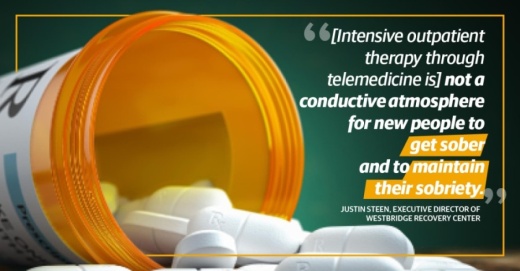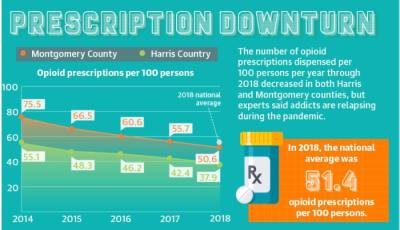The number of opioid prescriptions dispensed per 100 persons annually decreased in Montgomery County between 2014-18 from 75.5 per 100 persons to 50.6, according to 2018 data from the CDC—the most recent data available from the agency. In Harris County, the number decreased from 55.1 per 100 persons to 37.9 in the same time period.
Despite the overall decrease in opioid prescriptions, rehabilitation specialists in the Lake Houston area said the recent coronavirus pandemic is causing a “relapse epidemic” of opiate addicts as well as those who are struggling to overcome other types of addictions.
Agatha Sacks, owner and program coordinator at Positive Recovery Humble, said her facility has seen an increase in clients relapsing due to economic or relationship issues.
“All of those [factors] are on the rise, and most of those things are going to be triggers for clients,” Sacks said.
In mid-March, Positive Recovery Humble had to shut its doors and switch to telemedicine to help prevent the spread of the coronavirus. Around the same time, Sacks said she began seeing many readmissions from formerly sober clients.
Also contributing to more cases at Positive Recovery Humble is the small number of intensive outpatient, or IOP, treatment facilities in the Lake Houston area, Sacks said.
WestBridge Recovery Center in Kingwood typically offers IOP care, partial hospitalization and full-time residential treatment, Executive Director Justin Steen said. However, to protect its full-time residents during the pandemic, WestBridge had to temporarily suspend its IOP services and partial hospitalization, he said.
It has since begun telemedicine for IOP care. Steen said the virtual setup for meetings can prove difficult for new patients trying to get sober.
“It’s not a conductive atmosphere for new people to get sober and to maintain their sobriety,” he said.
Positive Recovery Humble reopened its in-person IOP treatments to clients May 11 with the option to either attend group sessions in person or virtually. Sacks said many clients are striving to see the bright side.
“Part of this virus has been a good thing because it’s allowed a lot of people to be still,” she said. “In that stillness, they’ve been able to have clarity on what is and isn’t important for them as they move forward.”






